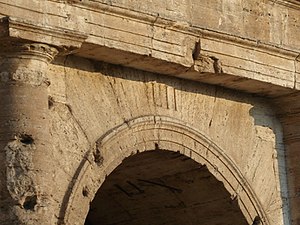Roman numerals
Rouman numerals, the numeric seestem uised in auncient Roum, employs combinations o letters frae the Laitin alphabet tae signify values. The nummers 1 tae 10 can be expressed in Roman numerals as follaes:

- I, II, III, IV, V, VI, VII, VIII, IX, X.
The Roman numeral seestem is a cousin o Etruscan numerals. Uise o Roman numerals continued efter the decline o the Roman Empire. Frae the 14t century on, Roman numerals began tae be replaced in maist contexts bi mair convenient Hindu-Arabic numerals; however this process wis gradual, an the uise o Roman numerals in some minor applications continues tae this day.
Readin Roman numerals
eeditMMXXIV
|
| "2024" as a Roman numeral |
Roman Numerals, as uised theday, are based on seven seembols:[1]
| Symbol | Value |
|---|---|
| I | 1 |
| V | 5 |
| X | 10 |
| L | 50 |
| C | 100 |
| D | 500 |
| M | 1,000 |
References
eedit- ↑ Alphabetic symbols for larger numbers, such as Q for 500,000, have also been used to sindry degrees of standardization.Gordon, Arthur E. (1982). Illustrated Introduction to Latin Epigraphy. Berkeley: University of California Press. ISBN 0520050797.